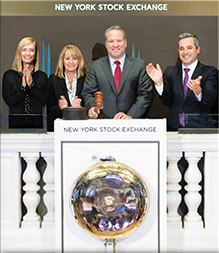(excerpt)
Five years have passed since the 2008 worldwide financial crisis. This crisis led to the demise or takeover of a number of well-known Wall Street institutions such as Bear Stearns, Lehman Brothers and Merrill Lynch. Other firms saw their market value decline significantly, but were able to survive the storm with assistance from the government or from financially healthier institutions. But now that that time has passed, are any of them worthy of a look as an investment?
Morgan Stanley has historically been one of the leaders in investment banking, underwriting and issuing new securities, and merger-and-acquisition activity. Prior to 2008, investment banks such as Morgan Stanley did not face the same regulatory requirements as traditional bank-holding companies, and were therefore able to use these advantages to produce very impressive returns on capital, while taking on more risks than their competitors.
The financial crisis essentially unraveled this business model, and Morgan Stanley (which lost over 80% of its market value between 2007 and 2008) was forced to convert to a traditional bank-holding company so that it could accept money from the Troubled Asset Relief Program, otherwise known as TARP. …
…In 2009, Morgan Stanley and Citigroup agreed to merge their wealth-management operations, creating the world’s largest full-service broker. This merger helped strengthen Morgan Stanley’s wealth-management division, while providing revenue stability as compared to their investment-banking business.
Today, the global markets have essentially recovered from the 2008 crisis, yet Morgan Stanley’s share price is still well below its 2007 high. Clearly, the firm has yet to recover its premium reputation in the eyes of investors. …
…Going forward, an increase in interest rates to more normal levels (i.e., above the very low levels kept in place by the Federal Reserve for the past few years) should add to the company’s net-interest income — the spread between what it can make from activities such as margin loans, over what it must pay for capital. The low-rate environment resulted in negative net-interest income in 2012, but has the potential to add billions annually to the bottom line based on the firm’s assets under management. …
…Another factor to assess when analyzing this stock is the overall potential for the (now renamed) Smith Barney operations, on which it recently assumed full ownership. It is clear that management has high expectations for their wealth-management business, which in 2012 comprised 52% of the company’s revenue, compared to 31% in 2007. This shift in focus is understandable, and we believe management can successfully execute this ongoing transition.
Morgan Stanley represents an attractive opportunity to invest in a franchise that is currently being valued at a discount to its competitors in many important metrics. As net-interest income continues to increase with rising interest rates, Morgan Stanley is positioned to benefit materially. …
If you would like a copy of the complete article, please send an email request to This email address is being protected from spambots. You need JavaScript enabled to view it., or call toll-free 1-866-444-6246. If sending an email request, please include the following: title, date of article, and your mailing address.







